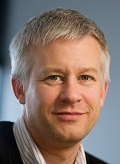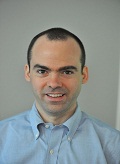Planning in Continuous Domains
Real domains are often described in terms of both logical change and physical dynamics, and planning with such hybrid domains is an important challenge. This workshop explores new approaches to planning for hybrid systems and integrating planning and control. Papers are encouraged from planning and related disciplines including model-based reasoning, control and run-time verification.
Online Proceedings (PCD13proceedings)
The PCD workshop is scheduled on the 11th of June in the A6 room at the Department of Computer, Control and Management Engineering (DIAG), University of Rome “SAPIENZA”.
|
09:20-09:30 |
Welcome message and introduction |
| 09:30-10:00 | Alessandro Cimatti SMT-based Verification of Hybrid Systems |
| 10:00-10:30 | Erion Plaku and James McMahon Motion Planning with Linear Temporal Logic for Underwater Vehicles Operating in Constrained Environments |
|
10:30-11:00 |
Coffee Break |
|
11:00-11:30 |
Johannes Aldinger and Johannes Löhr Planning for Agile Earth Observation Satellites |
| 11:30-12:00 | Amanda Coles and Andrew Coles PDDL+ Planning with Events and Linear Processes |
|
12:00-12:30 |
Sertac Karaman Sampling-based Motion Planning with Temporal Logic Specifications |
|
12:30-14:30 |
Lunch Break |
|
14:30-15:00 |
Christian Muise, J. Christopher Beck and Sheila A. McIlraith Flexible Execution of Partial Order Plans With Temporal Constraints |
|
15:00-15:30 |
Daniel Nikovski Operational Planning of Thermal Generators with Factored Markov Decision Process Models |
|
14:00-14:30 |
Masahiro Ono and Brian C. Williams p-Sulu, a Risk-Sensitive Plan Executive: from Building to Spacecraft |
List of Accepted papers
- Alessandro Cimatti
SMT-based verification of Hybrid Systems - Sertac Karaman
Sampling-based Motion Planning with Temporal Logic Specifications - Masahiro Ono and Brian C. Williams
p-Sulu, a Risk-Sensitive Plan Executive: from Building to Spacecraft - Johannes Aldinger and Johannes Löhr
Planning for Agile Earth Observation Satellites - Daniel Nikovski and Weihong Zhang
Operational Planning of Thermal Generators with Factored Markov Decision Process Models - Christian Muise, J. Christopher Beck and Sheila A. McIlraith
Flexible Execution of Partial Order Plans With Temporal Constraints - Amanda Coles and Andrew Coles
PDDL+ Planning with Events and Linear Processes
Call for papers
Topics and Objectives
The purpose of the workshop is to explore and promote alternative approaches to planning with hybrid models. A hybrid system is a system with both continuous control variables and discrete modes, leading to hybrid models. One way to address robust control of hybrid systems is to establish bi-directional communication between the continuous control of the sub-systems and the supervisory control of the overall system. The form of the communications, and the resulting type of integration between the different levels of control, have been topics of robotics research around the world since Shakey was developed at SRI in the late 1960s. However, if the goal is to have intelligent robots that can plan, act, react to world and replan in a robust, effective and enduring way, existing methods have not solved the problem.
Making this work is an important challenge for AI Planning, because a seamless connection between high level goal-directed reasoning and sub-system control is required if ever planning is to provide the supervisory control of persistently autonomous robots operating competently in human environments.
ICAPS 2012 ran a special track on Continuous Planning, attracting a range of excellent talks on the topic of integrated planning and control. This track brought planning experts, roboticists, experts in model-based reasoning, experts in run-time verification and control engineers together, leading to the start of some interesting discussions about new ways to tackle the problem of persistent intelligent autonomy. Rather than allow that track to be a one-off event, we propose to run workshops to develop this theme over successive ICAPS starting in 2013. Our objective is to explore new ways of integrating planning and control, leading to new architectures for closed-loop planning.
The workshop includes – but is not limited to – the following topics:
- Planning with mixed discrete-continuous dynamics
- Hybrid systems applications
- Planning/Control interaction
- Novel benchmark problems involving hybrid dynamics
- Plan monitoring and execution
- Plan robustness
- Plan validation
Submissions
Paper submission is in PDF only. Please format submissions in AAAI style. Refer to the author instructions on the AAAI web site for detailed formatting instructions and LaTeX style files. Final papers will be in the same format, keep them to at most 8+1 pages long (meaning 8 pages plus 1 extra page containing only references).
Papers must be submitted by April 5th, 2013. All ICAPS deadlines refer to 23:59 in the UTC-12 time zone. (So if there is still some place in the world where the deadline has not yet passed, you are on time.)
Paper Submissions should be made through the workshop EasyChair web site https://www.easychair.org/conferences/?conf=icapswpcd2013
Deadlines
Submission deadline (extended): April 5th, 2013
Notification: April 22nd, 2013
Final version: April 29th, 2013
Workshop date: June 11th, 2013
Workshop Program Chairs
- Maria Fox, King’s College London, UK
maria.fox@kcl.ac.uk - Derek Long, King’s College London, UK
derek.long@kcl.ac.uk - Daniele Magazzeni, King’s College London, UK
daniele.magazzeni@kcl.ac.uk - Brian Williams, Massachusetts Institute of Technology, USA
williams@csail.mit.edu - Masahiro Ono, Massachusetts Institute of Technology, USA
hiro_ono@mit.edu
Program Committee
- Alessandro Cimatti (FBK-irst, Italy)
- Maria Fox (King’s College London, UK)
- Emilio Frazzoli (MIT, USA)
- Michael Hofbaur (UMIT, Austria)
- Hadas Kress-Gazit (Cornell University, USA)
- Martin Leucker (University of Lübeck, Germany)
- Derek Long (King’s College London, UK)
- Daniele Magazzeni (King’s College London, UK)
- Masahiro Ono (MIT, USA)
- Erion Plaku (Catholic University of America, USA)
- Gregory Provan (University College Cork, Ireland)
- Stefan Ratschan (Czech Academy of Sciences, Czech Republic)
- Wheeler Ruml (University of New Hampshire, USA)
- Martin Sachenbacher (Technische Universität München, Germany)
- Scott Sanner (NICTA, Australia)
- Louise Travé-Massuyès (LAAS-CNRS, France)
- Brian C. Williams (MIT, USA)






